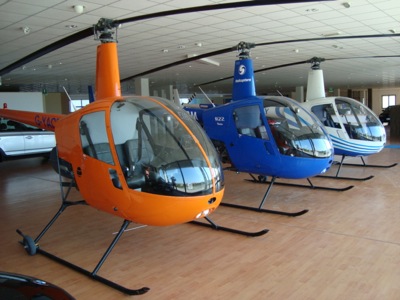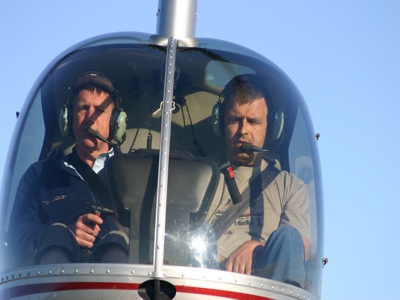




Here is some general advice on how to buy the right helicopter. I've tried to make it as clear and succinct as possible, but don't hesitate to ask for clarification on anything.
The first piece of advice I give is to take care when listening to advice! In particular, be vigilant when talking to people involved in flight training schools. They see you as an investor in their business, someone to facilitate the growth of their training school or charter operation.

In many ways, this is not a Bad Thing, provided that you are aware of this. Making sure that the aircraft they recommend is actually the type you want is important. Recently I came across an instructor who was trying to persuade his student that he should buy an EC120. This is a £1 million spend on a sophisticated turbine-engined aircraft, and totally unsuitable for an ab-initio private pilot. The advice was driven by the desire to be able to offer said EC120 to self-fly hirers and for AOC work.
So watch out for vested interests!
The same advice is true when it comes to listening to salesmen, like me! Ignoring the downright dishonest faction (and there certainly is one), the usual problem is that the salesman will try and sell you what he has got to sell, and not necessarily the machine that you ought to buy.
So, on first contact, if the salesman doesn't spend time finding about you, your flying experience and your intended use, you shouldn't buy from this organisation. The guy might be an expert on aviation, but there's no way he is in a position to give you sensible advice unless he's bothered to get to know a bit about you.
The price is always a difficult area. As well as the usual difference depending on whether you are buying or selling, you'll find that all helicopters fit into just two categories: Pay Now, or Pay Later.
Although this may sound like a quip, I do mean it! The same type of helicopter can vary in price by hundreds of thousands of pounds, and it can be ever so confusing as to what represents good value.
Again, it comes down very much to your personal circumstances - what is important to you and what you intend to do with the aircraft. As a (very) general rule of thumb, a nearly new helicopter usually represents best value in the same way as buying a 2-3 year old car does.
But you must also take into consideration factors such as capital invested, insurance costs, depreciation and in particular scheduled maintenance. My view is that you should find the best compromise in all these factors. It's a very personal thing, and I'll be very happy to explain further should you want me to.
The first step in buying your first helicopter is to set yourself a budget. If you don't you'll be forever chasing your tail, vacillating between this one and that one. You'll waste a lot of time, and possibly a lot of money.
Having set your budget, it will be easy to discount not just lots of a particular type of helicopter, but also whole categories of helicopters.
The second step is to be decisive. Once you've found the one you think you want, make an offer and if it is accepted, put a deposit down. There are an awful lot of "tyre kickers" in this industry and both owners and brokers alike will work a lot harder for you if you are prepared to leave a deposit. It can be left subject to, for example, a satisfactory engineer's report.
On the subject of engineer's reports, my view is that if the records are complete, the aircraft is NOT a turbine helicopter and the aircraft is less than (say) 12 years old, the benefit of getting a report is questionable. On the other hand, if you are buying (for example) a 30 year old Jet-Ranger, then an engineer's report is essential. Again, I 'd be happy to elaborate on this topic too - it is important.

If you've already made the decision that you are going to have your own helicopter, but you've only just started to learn, you should buy sooner rather than later. First, to rent a machine to learn to fly is expensive. Second, you'll get best value, better flexibility in training and more fun if you learn on your own machine. Third, you really should learn on the type that you are going to buy.
This last point is not just about money, although it is a factor (you'll have to do at least 5 hours extra instruction and more exams to convert from the from one type to another). The main reason is that the more you fly on one particular machine, the more comfortable you will feel in it. You'll get to know its characteristics and its limitations.
As an early houred pilot, the less you have to consciously think about, the safer and better pilot you will be. I'm reasonably sure that as long as you do the majority of your course on a particular type, you will take your test and be rated on this machine. So to do, for example, 20 hours in a 269 and 30 hours in a R44 will give you a R44 rating, but not a 269 rating. Your instructor should be able to give you the exact details about this.
Another factor in choosing a machine is the convenience for maintenance. It's always a hassle, so you should choose a type that can be maintained by people you like and people you trust who are located relatively close to you. We get our aircraft maintained at Rotorspan in Droitwich and we recommend them. +44 1905 774 831.
Deciding on how many years or hours you want to have is entirely dependent on budget, so I'm pretty much unable to suggest what you should be looking at without more information. However - and as a general rule - for a private pilot, years remaining are more valuable than hours remaining. The opposite is true for a commercial operation.
I hope you find this useful, and if you would like to talk to us further about buying your first helicopter, please fill in the form below or email us sales@flyq.com Or by phone, +44 1568 616 157.